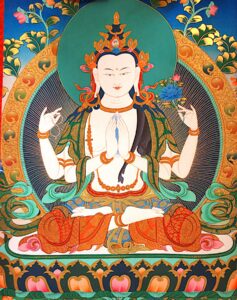What is this extraordinary concept of bodhichitta? It is variously translated as the mind of enlightenment, the spirit of enlightenment and the awakening mind. Maitreya explained bodhichitta in his Ornament for Clear Realisation “bodhichitta means: for the sake of others, wishing to attain complete, perfect enlightenment”.
Bodhichitta has two aspects. The main part is the compassionate mind that naturally and spontaneously wants to relieve the suffering of all fellow living beings without exception – a pure good heart. The second aspect is realising that to help others, we need to awaken our own natural purity of mind and attain enlightenment. We need to wake up from an endless bad dream of ignorance, dissatisfaction, upset, loss and suffering if we are going to be able to support others. After all, if we are neck deep in a swamp, it is hard to pull anyone else out.
For inspiration to practice, we ordinary folk need to get some sense of what the awakening mind is like. So, how do we get even a glimpse of this radiant, wonderful state of purity- the state of being a Bodhisattva? If we are lucky enough to be able to spend some time with holy and extraordinary gurus, such as His Holiness the Dalai Lama or Geshe Acharya Thubten Loden, it becomes obvious that Bodhisattvas operate in a very different way to ourselves.
But mainly we need to acquaint ourselves with the beautiful scriptural teachings on bodhichitta, such as those in The Path to Enlightenment in Tibetan Buddhism. By reading, listening, thinking and meditating on bodhichitta, then we might start to see how extraordinary our lives could become. The peerless master and great scholar Shantideva encapsulated bodhichitta in this verse: “Just like space, and the great elements such as earth, may I always support the lives of limitless living beings”.
The central message of the spiritual head of the Tibetan Buddhist Society, Geshe Acharya Thubten Loden, was bodhichitta. Geshe-la lived bodhichitta, he taught bodhichitta for decades and emphasised the extraordinary and unending benefits that only bodhichitta can bring to our world.
In his final weeks, Geshe-la particularly quoted Shantideva’s verse from Engaging in the Bodhisattva Deeds: “All other virtues are like the plantain tree, for after bearing fruit they simply perish, but the perennial tree of the bodhichitta, bears fruit unceasingly and flourishes.”
His entire life was an expression of bodhichitta, in his relentless pursuit of enlightenment with the sole purpose of benefiting others. His persistent and clear message to us was: definitely and certainly, we must make the effort to develop bodhicitta.
In our own spiritual practice, it is easy to see that, as years sail by and wrinkly old age beckons, not much else but bodhichitta matters. If we are making little effort to develop bodhichitta, or not dealing with the personal obstructions that prevent us from developing it – such as our personal dislikes and biases – then we have missed the point. If we are genuinely striving to develop bodhichitta then we’re doing ok.

